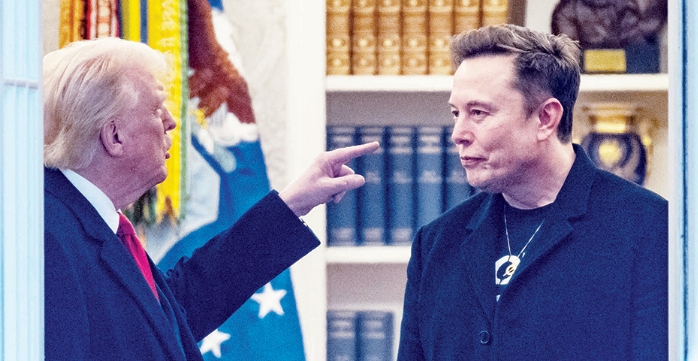Musk-Trump Feud: A Strategic Play or a Risky Gamble? Morgan Stanley Weighs In
Elon Musk recently found himself at odds with President Donald Trump in a public feud that rattled financial markets and sparked intense debate among investors. What began as Musk’s outspoken criticis

Elon Musk recently found himself at odds with President Donald Trump in a public feud that rattled financial markets and sparked intense debate among investors.
What began as Musk’s outspoken criticism of Trump’s tax-cut bill escalated into a bitter clash, with Tesla’s stock plunging 14% in a single day—wiping out $150 billion in market value—and Trump threatening to sever federal contracts critical to SpaceX.
Yet, recent developments, including Musk’s expression of regret and an intriguing analysis from Morgan Stanley, suggest the conflict may be shifting gears, raising questions about its deeper implications for Tesla and Musk’s broader business empire.
The Feud Ignites: Taxes, Threats, and Market Turmoil

The rift erupted when Musk labeled Trump’s tax-cut bill a “disgusting abomination,” citing its projected $2.4 trillion addition to government deficits over the next decade, per the Congressional Budget Office.
Musk, who had been a key Trump ally and led the Department of Government Efficiency—an initiative targeting $1 trillion in savings but delivering just $180 billion—saw the bill as a betrayal of fiscal responsibility. Trump fired back, threatening to cancel government contracts with Musk’s companies, a move that could cripple SpaceX, which depends heavily on federal partnerships.
The fallout was swift. Tesla’s stock, already down nearly 18% this year amid Musk’s polarizing political stances, took a sharp hit. Musk’s provocations—claiming credit for Trump’s election win and linking him to Jeffrey Epstein’s crimes—only fueled the fire. Yet, the stock regained some ground after Musk’s next move: a public apology.
Musk Backs Down, Trump Says He Could Forgive
On Wednesday, Musk posted on X, “I regret some of my posts about President @realDonaldTrump last week. They went too far.” This followed a Friday call with Vice President JD Vance and White House chief of staff Susie Wiles, who pressed Musk to de-escalate, according to sources familiar with the discussion.

Musk had also privately called Trump prior to the post, as reported by the source familiar with this matter. Shares edged up less than 1% that afternoon, signaling cautious investor relief.
Trump acknowledged the gesture in an interview, saying, “I thought it was very nice that he did that,” but offered no firm olive branch. “We once had a good relationship, and I wish him well,” he told reporters, adding in another interview that he had “no interest” in reconciliation. Yet, "I guess I could," Trump's attitude has soften this week when speaking to journalists and asked if he could forgive Musk, adding, "but we have to straighten out the country."
"My sole function now is getting this country back to a level higher than it's ever been", he said.
Morgan Stanley’s Bold Take: Strategy Over Spite
While the feud’s intensity gripped headlines, Morgan Stanley analysts offered a provocative spin: it might be a deliberate ploy by Musk.
“Likely [the feud] part of a planned strategy by Elon to achieve a specific goal with his approach designed to bring maximum public attention to the issue,” the firm noted in a recent report. Analysts speculate Musk aimed to spotlight the tax bill’s fiscal risks, leveraging his platform to sway opinion.
Despite the market turbulence, Morgan Stanley remains steadfastly optimistic about Tesla, hiking its price target from $400 to $410 and naming it their “top pick” in the U.S. auto sector. The firm lauded Tesla’s dominance in physical artificial intelligence and other cutting-edge fields, arguing its long-term growth trajectory remains intact. Wedbush Securities’ Dan Ives echoed this sentiment on June 9, and Trump himself signaled a détente of sorts, expressing plans to retain his Tesla Model S and Starlink service.
Politics and Tesla: An Inseparable Narrative
Morgan Stanley underscored a critical shift: Musk’s political forays are now “very much inseparable” from Tesla’s investment story.
Investors hoping for a laser focus on Tesla’s operations may need to adjust expectations, as Musk’s public stances—while risky—are part of his broader playbook. The firm believes Tesla’s leadership is equipped to handle these dynamics, predicting no lasting damage from the Trump rift.
Looking Ahead: Volatility Meets Resilience
The Musk-Trump saga has been a wild ride for markets, with Tesla’s stock whipsawed by each twist. Musk’s contrition and Morgan Stanley’s strategic framing suggest a cooling phase, but Trump’s grudging response keeps tensions simmering. For investors, the stakes are clear: Musk’s political entanglements amplify Tesla’s volatility, yet its innovation edge—bolstered by AI leadership—sustains Wall Street’s faith. As this chapter unfolds, the feud may prove less a reckless gamble than a calculated move, one that tests Musk’s influence and Tesla’s resilience in equal measure.
Disclaimer: The views in this article are from the original Creator and do not represent the views or position of Hawk Insight. The content of the article is for reference, communication and learning only, and does not constitute investment advice. If it involves copyright issues, please contact us for deletion.